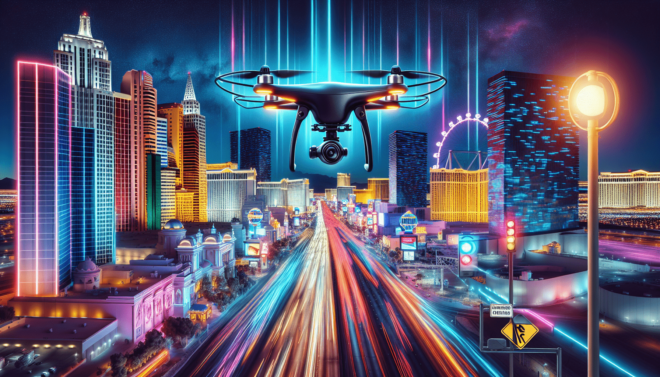Have you ever wondered what penalties visitors might face for unauthorized drone flights in Las Vegas? Given the popularity of drones and the allure of capturing stunning aerial footage, it’s natural to be curious about the rules and consequences associated with flying drones in a city as bustling as Las Vegas. As drones become more prevalent, so do the regulations governing their use, especially in busy and high-security areas like Las Vegas. Flying a drone might seem harmless, but doing so without proper authorization can lead to significant legal and financial repercussions.
Understanding Drone Regulations in Las Vegas
Las Vegas, with its iconic cityscapes and vibrant nightlife, might seem like the perfect place to fly a drone. However, due to safety, privacy, and security concerns, there are strict regulations in place. Understanding these regulations is crucial for avoiding any penalties.
Federal Aviation Administration (FAA) Regulations
All drone activities in the United States are primarily regulated by the Federal Aviation Administration (FAA). The FAA has put in place several regulations to ensure the safety of airspace and people on the ground. Whether you’re a hobbyist or a commercial operator, you must abide by these rules:
- Registration: Any drone weighing between 0.55 pounds (250 grams) and 55 pounds (25 kilograms) must be registered with the FAA.
- Flight Restrictions: Drone operators must keep their drones below 400 feet, maintain a visual line of sight, and avoid flying near other aircraft, over groups of people, or near emergency response efforts.
- Airspace Classes: Las Vegas has various airspace classes that restrict drone usage. Know where you’re flying, as certain areas, especially around McCarran International Airport, are highly restricted.
Local Restrictions in Las Vegas
In addition to federal regulations, Las Vegas has local ordinances that further restrict drone use. Some notable rules include:
- No-Fly Zones: Certain areas in Las Vegas, such as near McCarran International Airport, the Las Vegas Strip, and other critical infrastructures, are no-fly zones for drones.
- Special Events: During large events, like music festivals or sports games, additional temporary flight restrictions may be in place.
- Permits: In some cases, you might need to obtain special permits to fly in certain areas or for specific purposes.
Potential Penalties for Unauthorized Drone Flights
The penalties for unauthorized drone flights can be quite severe and vary depending on the nature and severity of the infraction. Below are some potential penalties you could face if you decide to fly your drone illegally in Las Vegas.
Civil Penalties
Civil penalties usually involve fines and are typically imposed by the FAA for minor infractions. Here are a few examples:
| Category | Potential Fine |
|---|---|
| Failure to register | Up to $27,500 |
| Flying in restricted areas | Up to $1,500 (per incident) |
| Endangering safety | Up to $20,000 |
Civil penalties are generally intended to encourage compliance and serve as a warning for drone operators to adhere to the rules.
Criminal Penalties
For more serious offenses, criminal charges may be filed. These can include hefty fines and even imprisonment, depending on the gravity of the violation. Common criminal penalties include:
- Reckless Operation: Flying a drone recklessly or in a manner that endangers people or property can result in criminal charges.
- Privacy Violations: Using a drone to invade someone’s privacy, such as capturing images of private property without consent, can lead to criminal charges.
- Interference with Emergency Services: Flying a drone near emergency response efforts can not only impede their work but also result in severe criminal penalties.
Confiscation of Equipment
In addition to fines and possible jail time, authorities have the right to confiscate your drone and related equipment if you’re found flying it illegally. This can include:
- The drone itself
- Controllers
- Memory cards with footage
- Any other related accessories
This can be a significant financial loss, as high-quality drones and their equipment are quite costly.
Banned from Future Drone Use
Repeat offenders or those who commit particularly egregious violations may face bans from future drone operations. This could be temporary or permanent, depending on the severity of the offense. Such bans can affect both personal and commercial drone use, making it a serious consideration for anyone relying on drones for their livelihood.
How to Legally Fly a Drone in Las Vegas
Now that you’re aware of the potential penalties, let’s explore how you can legally enjoy flying your drone in Las Vegas. Following these guidelines will help you stay within the bounds of the law and avoid any unpleasant consequences.
Register Your Drone
If your drone weighs between 0.55 pounds and 55 pounds, you’ll need to register it with the FAA. Registration is a straightforward process that can be done online through the FAA’s website. You’ll receive an identification number that must be displayed on your drone.
Understand Airspace and No-Fly Zones
Familiarize yourself with the airspace classifications and specific no-fly zones in Las Vegas. Apps like B4UFLY, provided by the FAA, can help you determine where you can safely and legally operate your drone. Always respect permanent and temporary flight restrictions to avoid fines and penalties.
Obtain Necessary Permits
For certain areas or events, you may need to obtain specific permits to operate your drone legally. Check with local authorities or event organizers to ensure you have all the required permissions before flying.
Follow Operational Guidelines
Always adhere to the FAA’s operational guidelines:
- Keep your drone within the visual line of sight.
- Do not fly over people or moving vehicles.
- Avoid flying near other aircraft, especially manned aircraft.
- Follow altitude restrictions and keep your drone below 400 feet.
Respect Privacy
Avoid flying your drone in a way that could violate someone’s privacy. This includes refraining from capturing footage of private property without explicit permission. Always be considerate of people around you and respect their right to privacy.
Common Misconceptions About Flying Drones in Las Vegas
It’s easy to believe some common misconceptions about drone flying, especially in popular areas like Las Vegas. Let’s dispel some of these myths so you can fly your drone with confidence and legality.
“It’s Legal to Fly My Drone Anywhere If I’m on Vacation.”
Just because you’re on vacation doesn’t mean you can fly a drone anywhere you please. Local, state, and federal regulations still apply regardless of your status as a visitor. Always check the local rules before you take your drone out for a spin.
“If I’m Not Near an Airport, It’s Safe to Fly.”
While avoiding airports is essential, many other areas have restrictions you need to be aware of. The Las Vegas Strip, for example, is a no-fly zone due to the dense population and security concerns. Always check for local no-fly zones beyond just avoiding airports.
“It’s Okay to Fly Over Crowds if I’m Careful.”
Flying over crowds is prohibited due to the safety risks involved. Even if you think you’re being careful, unexpected issues like loss of control or battery failure can pose serious hazards to people below.
“I Don’t Need to Register My Drone Because It’s Just a Toy.”
While smaller, toy-like drones that weigh less than 0.55 pounds do not require registration, more substantial drones must be registered. If in doubt, it’s safer to check the weight and confirm whether registration is necessary.
What to Do If You Inadvertently Violate Drone Regulations
Despite your best intentions, it is possible to inadvertently violate drone regulations. Understanding what to do in such situations can help mitigate potential penalties.
Immediate Actions to Take
If you realize you’ve accidentally flown your drone in a restricted area or otherwise violated regulations, take these immediate steps:
- Land Your Drone Safely: Bring your drone back to the ground as safely and quickly as possible.
- Assess the Situation: Determine the extent of the violation and gather any relevant information, such as flight logs or footage.
Self-Reporting
The FAA encourages self-reporting of inadvertent violations through their DroneZone portal. This can sometimes result in lesser penalties, as it demonstrates your willingness to comply and acknowledge your mistake.
Cooperate with Authorities
If approached by authorities, cooperate fully. Provide any requested information and comply with their directives. Arguing or becoming confrontational will only worsen the situation.
Future Trends in Drone Regulations
Drone technology is rapidly evolving, and so are the regulations that govern its use. Staying informed about future trends can help you prepare and adapt to new rules.
Increased Restrictions in Urban Areas
As more people use drones, you can expect increased restrictions in densely populated urban areas like Las Vegas. These may include more no-fly zones and stricter operational guidelines to ensure public safety.
Technological Advancements
New technologies, such as geofencing, are being implemented to automatically restrict drones from flying into no-fly zones. Familiarizing yourself with these technologies can help you stay compliant with regulations.
Greater Emphasis on Privacy
With growing concerns about privacy, regulations may increasingly focus on preventing invasive drone use. Expect more stringent rules regarding where and how you can capture footage, especially in residential areas.
Enhanced Penalties
As drone incidents become more frequent, penalties for violations are likely to become even more severe. Staying compliant with current regulations and being aware of potential changes is crucial for avoiding hefty fines or criminal charges.
Summary and Final Thoughts
Flying a drone in Las Vegas can offer incredible opportunities for capturing unique footage and enjoying a fun hobby. However, the city’s dense population, landmarks, and security considerations mean that strict regulations are in place to ensure public safety and privacy. Ignoring these rules can lead to significant civil and criminal penalties, including fines, confiscation of equipment, and even jail time.
By understanding and following the FAA regulations and local Las Vegas ordinances, you can ensure a safe and enjoyable flying experience. Register your drone, respect no-fly zones, obtain necessary permits, and always prioritize safety and privacy when operating your drone.
Stay informed about future trends and technology advancements to remain compliant with evolving regulations. By doing so, you’ll not only avoid penalties but also contribute to a safer environment for everyone.
Whether you’re a hobbyist or a commercial operator, responsible drone flying is the key to enjoying this amazing technology without facing the negative consequences of unauthorized flights. Happy flying!

